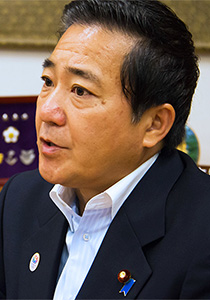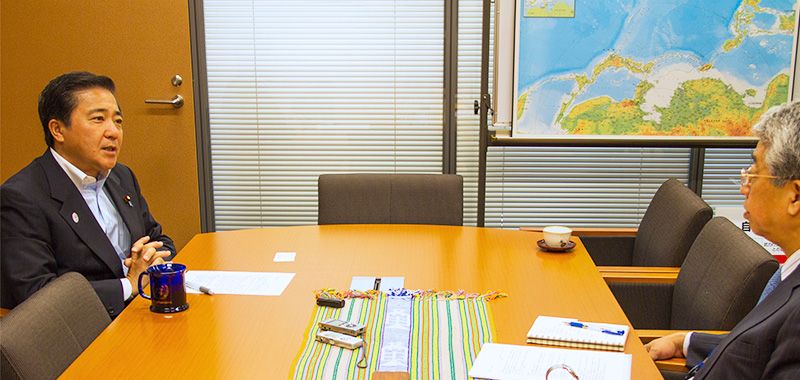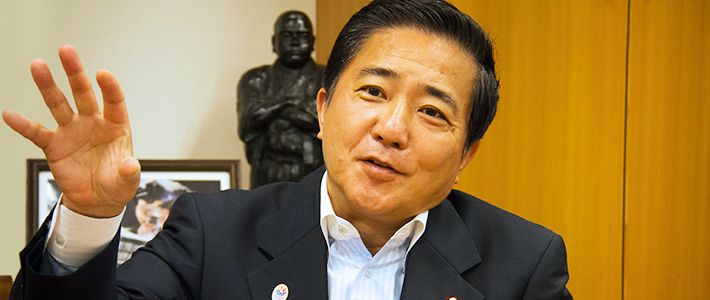
The Opposition Stance on Security Policy
Politics- English
- 日本語
- 简体字
- 繁體字
- Français
- Español
- العربية
- Русский
An Unavoidable Issue
INTERVIEWER First, what is your assessment of Prime Minister Abe Shinzō’s proposed security legislation?
NAGASHIMA AKIHISA My feeling is that the debate in Japan has reached this point at long last. Of course, I’m aware of the concerns about the proposed legislation, which many—particularly people from the wartime generation—criticize as dangerous. But the debate on the issue of collective self-defense dates back to the 1980s. And the Japan-US team will continue to be the axis for maintaining peace and stability in the Asian region. So strengthening this axis is an issue that we can’t avoid addressing.
As I see it, there are three major questions at hand: One, how should we respond to the changes in the security environment? Two, how far can we go in making the Japan-US alliance more mature? How can we make the relationship more bilateral and more equal? And three, how will we set the constitutional bounds within which the reform of security policy must be conducted? There’s the issue of consistency in the interpretation of the Constitution by the executive branch, and there are also the interpretations of Article 9 from the judicial branch, notably the December 1959 Supreme Court ruling on the Sunagawa Incident.(*1) The legislative branch also has the right of interpretation, and I see the deliberations on the proposed security legislation as offering a good chance for the Diet to clarify its position.
The Split Within the Party
INTERVIEWER The Democratic Party of Japan has a range of views spanning the political spectrum, and it’s split on the security legislation issue. How is the party going to deal with this matter?
NAGASHIMA I think it’s a good thing that this issue has been thrust on us while we’re in the opposition. It won’t be easy to reach a conclusion within the DPJ, but we need to overcome this hurdle at some point in order to recover people’s trust as a party capable of governing. Post–World War II Japan has had a hard time with the issue of how to balance the pacifist ideal set forth in Article 9 of the Constitution against the reality of our security requirements. But in terms of the overall vision, the DPJ’s position differs from what the Abe administration is aiming for with its security legislation. I hope we can make this clear to the public through deliberations in the Diet.
INTERVIEWER How does your party’s position differ from that of Abe’s Liberal Democratic Party?
NAGASHIMA To sum it up as a slogan, we’re calling for “restraint afar, realism nearby, and active involvement in humanitarian reconstruction.” This distinction between “afar” and “nearby” is our summation of the issues, which involve both a geographical perspective and the question of whether a given situation is one that relates directly to Japan’s own peace and security.
The Abe administration, with its talk of “seamless” security, is trying to apply the same set of standards to everything, including problems that relate directly to Japan’s peace and security and problems occurring on the other side of the globe that have no such direct connection. In terms of the structure of the current Constitution, the administration’s proposals go a bit beyond the bounds. In terms of implementation as well, the administration is overstretching, extending its reach too broadly.
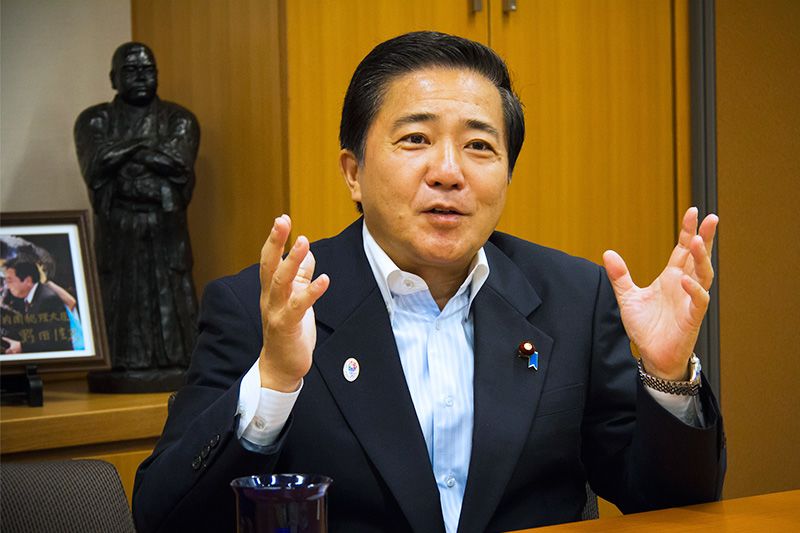 On the issue of collective self-defense, the DPJ has decided that it cannot approve the Abe administration’s move to allow the exercise of this right based on the new set of three conditions it has set forth, which are extremely vague. But that doesn’t mean that our party has totally and permanently rejected exercising the right of collective self-defense. For example, Japan-US cooperation is necessary for missile defense and for dealing with situations in areas surrounding Japan. We don’t deny that there is room under the current Constitution for activities by Japan that up to now have been seen as going beyond the scope of individual self-defense in areas like these.
On the issue of collective self-defense, the DPJ has decided that it cannot approve the Abe administration’s move to allow the exercise of this right based on the new set of three conditions it has set forth, which are extremely vague. But that doesn’t mean that our party has totally and permanently rejected exercising the right of collective self-defense. For example, Japan-US cooperation is necessary for missile defense and for dealing with situations in areas surrounding Japan. We don’t deny that there is room under the current Constitution for activities by Japan that up to now have been seen as going beyond the scope of individual self-defense in areas like these.
The DPJ Role in Revising the Defense Cooperation Guidelines
INTERVIEWER The Guidelines for Japan-US Defense Cooperation were recently revised for the first time in eighteen years.
NAGASHIMA The idea of revising the guidelines was an initiative proposed to the United States by Japan about three years ago, back when the DPJ was in power, and Morimoto Satoshi was minister of defense. I was serving as senior vice minister, and I traveled to the United States to present our proposal. It was unusual for the Japanese side to initiate a proposal of this sort; we did so in consideration of the fact that Japan’s security environment had changed greatly.
The last time the guidelines had been revised, which was in 1997, it was in response to various requests from the US side arising from the inadequate response to the North Korean nuclear crisis of 1993–94; the revisions were then incorporated into the Act on Measures to Ensure the Peace and Security of Japan in Perilous Situations in Areas Surrounding Japan [enacted in 1999]. This time, when we presented our requests from the Japanese side, the Americans were initially reluctant to undertake a revision targeting China.
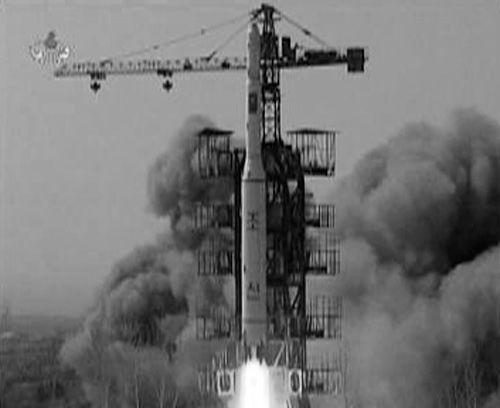 A Taepodong-2 missile launch. (© KRT/Reuters/Aflo)
A Taepodong-2 missile launch. (© KRT/Reuters/Aflo)
When we proposed the revision, we weren’t totally ignoring the question of whether to go ahead with allowing the exercise of the right of collective self-defense from the outset. But we started bilateral discussions with a view to the needs of those on the front lines, and when the LDP returned to power, we passed our work on to the Abe administration, which was eager to allow the exercise of this right. That’s how the present guidelines came into being.
North Korea now has more than two hundred Rodong missiles, which are mobile and have a range that covers almost all of the Japanese archipelago. It has built small nuclear warheads that can be mounted on its missiles, some of which can now reach as far as the US mainland. Meanwhile, China’s military power is three or four times Japan’s. These major changes have made it necessary to review the sharing of roles, missions, and capabilities in the defense cooperation between Japan and the United States.
Falling Short of US Expectations
INTERVIEWER Does the DPJ have a solid grasp of US thinking?
NAGASHIMA I visited Washington and New York in early May, so I’m on top of the latest situation. There are two problems: First, some people there are enthusiastic about the idea that Japan will be able to cooperate with the United States globally, but is this truly in Japan’s interest? We need to get the correct message across clearly to them. Second, some people there are rejoicing that Japan will be able to exercise the right of collective self-defense, but the actual extent of the collective self-defense that will be allowed under the agreement between the ruling parties amounts to only a slight extension of what has been allowed up to now as individual self-defense. It’s far short of what the United States had been hoping for, and when it comes to implementing this and translating it into actual operations, the Americans may be unpleasantly surprised at the limitations.
I’m quite concerned about the expansive rhetoric Prime Minister Abe has set forth, such as in his address to the US Congress this spring. In speaking to Americans, I explained my position as a member of the opposition, telling them, “Keep your eyes on the actual situation,” and “Don’t expect too much, or you’ll be disappointed.” In order for Japan to do more, I think the Constitution will need to be amended.
Confronting the Military Pressure from China
INTERVIEWER I understand you were involved from the start in the move to nationalize the Senkaku Islands.
NAGASHIMA Our DPJ administration made the move to nationalize the Senkakus in September 2012. Official Chinese vessels had been violating the islands’ territorial waters since 2008. That was the year when the Chinese made a major change of course away from the “keep a low profile and bide your time” policy it had been following since Deng Xiaoping’s days. It was around this time that Chinese naval commanders began urging the Americans to accept a two-way split of the Pacific: “You can have the eastern part, and we’ll take charge of the west.” And they adopted an aggressive posture, seeking to deploy their military clout.
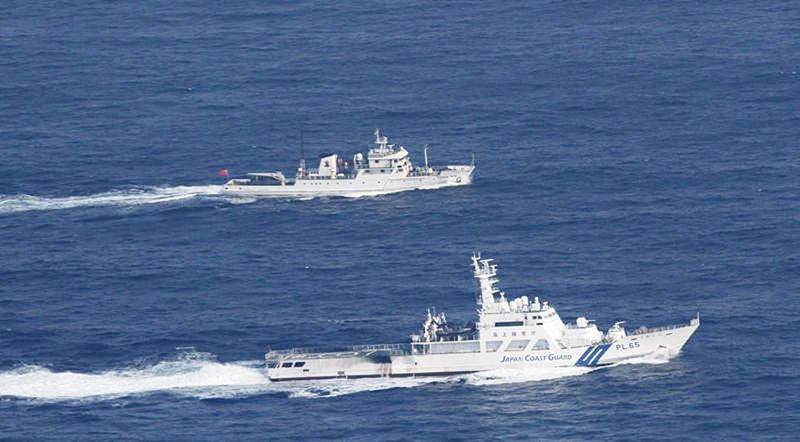 A patrol vessel of the Japan Coast Guard (below) and a ship from China’s fisheries administration in the waters off the Senkakus. (Photo courtesy Japan Coast Guard, © Jiji)
A patrol vessel of the Japan Coast Guard (below) and a ship from China’s fisheries administration in the waters off the Senkakus. (Photo courtesy Japan Coast Guard, © Jiji)
We took this step based on our overall assessment of China’s behavior, including the September 2010 Chinese fishing boat collision with Japan Coast Guard vessels, the frequent violation of Japan’s territorial waters around the Senkakus, and its forceful moves to press its territorial claims in the South China Sea. China’s response was clearly aberrant.
The DPJ administration acted decisively to purchase the Senkakus and place them under government administration, believing that unless we pushed back against the pressure from China, these islands, along with the islands of the South China Sea, were liable to be eaten away by China with its “salami slicing” incremental incursions. We initially sought to reach an understanding with the Chinese, explaining that the Japanese government was taking responsibility just to change the ownership of the islands and that we wouldn’t build structures or station personnel there. But the Chinese leadership was in the middle of a power struggle, and so the move led to the extremely unfortunate result of a violent backlash from the masses.
INTERVIEWER What sort of demands would you make of the Abe administration?
NAGASHIMA I’m very fond of US President Theodore Roosevelt’s saying, “Speak softly, and carry a big stick.” It means to take a soft approach in foreign relations while being solidly prepared to deal with eventualities. The danger of the Abe administration is that it’s speaking loudly. The stick, referring to preparedness, is necessary, but diplomacy based on loud, provocative statements is wrong. Prime Minister Abe should watch his words more carefully.
However, we need to act promptly in response to China’s advance. The Americans were too relaxed about the situation, and so, taking the case of the Senkakus as our starting point, we should build a stable, rule-based order and back it up with deterrent capabilities so that the Chinese won’t adopt a coercive foreign policy in the East and South China Seas.
End the Unproductive Debate Within the DPJ
INTERVIEWER The DPJ has yet to reach an internal consensus about amending the Constitution.
NAGASHIMA In 2006 we came up with a proposal calling for sōken, or “creation” of the Constitution. Neither the status quo nor kaiken, revision of the present Constitution, will do. When people talk about revision of the Constitution, the discussion tends to focus excessively on Article 9 and become a debate about maintaining Japan’s commitment to peace. Meanwhile, as a practical concern, we see human rights failing to be fully protected in public administration; this reflects the fact that the present Constitution contains no provisions directly relating to privacy rights, environmental rights, crime victims’ rights, and so forth. We clarified the issues with our proposal, based on our conviction that the Constitution should be subject to constant review in this respect.
Almost ten years have passed since then. In 2013 the DPJ’s Constitution Research Committee started deliberations, but unfortunately we’ve been going back and forth, failing to achieve real progress. Meanwhile, the Diet’s bicameral Research Commission on the Constitution has started conducting substantive deliberations, but since the DPJ has yet to achieve an internal consensus, some people in our party have been trying to duck the issue with statements like “We won’t take part in a debate over the Constitution under the Abe administration.” I’m unhappy with this state of affairs.
As a healthy opposition party that has a clear view of the real world, the DPJ needs to get over its internal arguments about whether or not to take part in these discussions. It’s not a productive debate.
(Translated from an interview conducted in Japanese by Harano Jōji, representative director of the Nippon Communications Foundation, on May 18, 2015.)
(*1) ^ After seven Japanese were arrested for entering a US military base in the town of Sunagawa (now Tachikawa in Tokyo) as part of a 1957 protest against expansion of the base, their case made it to the Supreme Court, which in 1959 overturned a district court ruling that had declared the presence of US forces in Japan to be in violation of Article 9 of the constitution. The Abe administration invoked this ruling in June 2015 to support its claim that the proposed security legislation is constitutional.—Ed.
China Democratic Party of Japan DPJ PKO collective self-defense Senkaku Islands constitution Japan-US Abe administration security legislation Defense Cooperation self-defense
